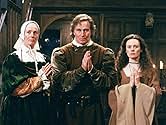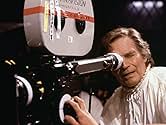Agrega una trama en tu idiomaKing Henry VIII wants to divorce his wife, and seeks the approval of the aristocracy. Sir Thomas More is a man of principle and reason, and is thus placed in a difficult position: should he ... Leer todoKing Henry VIII wants to divorce his wife, and seeks the approval of the aristocracy. Sir Thomas More is a man of principle and reason, and is thus placed in a difficult position: should he stand up for his principles, risking the wrath of a corrupt King fond of executing people ... Leer todoKing Henry VIII wants to divorce his wife, and seeks the approval of the aristocracy. Sir Thomas More is a man of principle and reason, and is thus placed in a difficult position: should he stand up for his principles, risking the wrath of a corrupt King fond of executing people for treason? Or should he bow to the seemingly unstoppable corruption of King Henry VIII, ... Leer todo
- Premios
- 1 premio ganado y 2 nominaciones en total
- Cardinal Wolsey
- (as Sir John Gielgud)
- Richard Rich
- (as Jonathon Hackett)
Opiniones destacadas
But he made sure he did get to do another screen version after appearing on stage in the production of Robert Bolt's play. He did something else too, what you see Heston in is how it actually was originally presented on stage with the Everyman Character, done here by Roy Kinnear, as a narrator.
When Bolt did the 1966 version for the screen, he adapted his own work and dropped the Everyman character probably because Fred Zinneman who directed the film wanted it that way. I believe Zinneman was right that what he did was better suited for the screen.
That's not to decry Heston's performance because as a man who made a career out of playing great men of character and integrity, Thomas More was definitely a role he was most suited for. I can certainly understand his disappointment. By the way, Heston's other goal never realized was to do Abraham Lincoln, but I'm guessing he never got a suitable script or story.
With son Fraser Clarke Heston as producer, I'm sure Heston got to pick who he would appear with and we are fortunate to have John Gielgud as Cardinal Wolsey, though Orson Welles in build and in acting style was much more suited for the role. Heston's very good friend from across the pond, Richard Johnson, got to play the key role of the Duke of Norfolk.
Though this production of A Man For All Seasons suffers from comparison to the Paul Scofield version, it can definitely stand on its own merits and Charlton Heston and the rest of the cast have nothing to be ashamed of.
It seems to me a sort of "England, England!" thing is standing in the way of a fair and objective comment on this film (as if I could give one...). Even though Charlton Heston has sunk very much in my esteem since "Bowling for Columbine" I feel I need to set the record straight (for my own peace of mind): This film is great, and believe you me, I am a Scofield fan (I simply adored him in the 1966 version of this film as well as in the 1994 Martin Chuzzlewit television film/mini-series).
But to do away with this 1988 version of Heston as a failed attempt to improve on Fred Zinneman is not only an unfair comparison but also a foolish one. To begin with: Heston's version is far closer and more true to Robert Bolt's play than is the Fred Zinneman version. In addition, Heston's performance, although more obviously dramatical than that of Scofield, is more passionate. The scene in which he thrashes Roper and stands for his daughter Meg is simply the greatest ("They put about too nimbly!!!"), as is his performance with the Duke of Norfolk when they discuss water spaniels. Next to Heston, the performance of his fellow actors should not be discarded.
Roy Kinnear, bless his soul, is brilliant as the common man (a Robert Bolt invention that stayed alive in this version but was left out of the 1966 Zinneman production)
In addition, the role of the king is played simply brilliantly by Martin Chamberlain. The scene in More's garden is a scene that will never be mastered.
Vanessa Redgrave gives one of her finest performances as More's wife. The scene in the Tower where they part for the last time is always tearing me apart! (Oh God, all these plain simple men!)
And of course the roles of the "two ugly ladies" Benjamin Withrow and Jonathan Hackett are delicious and not to be found anywhere so great in the 1966 Zinneman version.
So I beg you: Please be fair, enjoy the Zinneman version, but also take the time to (learn to) appreciate Heston's version. The man has his faults, but just appreciate that what he has done right!
Heston was brilliant as More and Redgrave was outstanding as Mistress More. The teleplay had much more of the sense of the original stage play than the hacked-up Hollywood flick the OP speaks of.
Guess it's a matter of taste, but Heston has NEVER been wooden, EVER. One of the greatest actors of our age. In my opinion only Richard Burton could probably have been a better casting choice than Heston--and he was dead by this time.
Heston was also remarkably gracious and effusive about Miss Redgrave's talent, even though they would never see eye-to-eye politically. He is a gracious man, a talented actor, and a wonderful husband and father. Would there were many more like him out of the dreck of Hollywood.
¿Sabías que…?
- TriviaMore was tried for High Treason for opposing the King's desire to be named head of the Church in England. Charges of treason were used to silence opposition to the King. When the Founding Fathers drafted the U.S. Constitution, cases such as More's led them to define treason in narrow terms, that is, "Treason against the United States, shall consist only in levying war against them, or in adhering to their enemies, giving them aid and comfort. No person shall be convicted of treason unless on the testimony of two witnesses to the same overt act, or on confession in open court."
- ErroresIn all the scenes which are supposed to take place on or near the River Thames, the waterbody is clearly a narrow lake, not a river.
- ConexionesVersion of El hombre de dos reinos (1966)
- Bandas sonorasOriginal Tudor Music
Composed by Henry VIII (as H.R.H. Henry VIII)
Selecciones populares
Detalles
- Fecha de lanzamiento
- Países de origen
- Idioma
- También se conoce como
- Un hombre de dos reinos
- Locaciones de filmación
- Productoras
- Ver más créditos de la compañía en IMDbPro





















